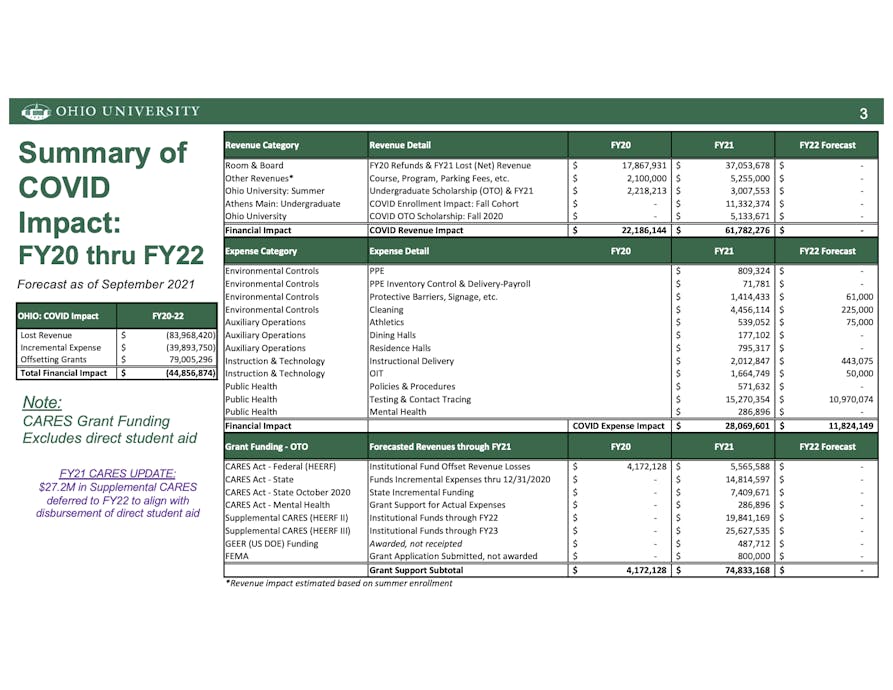From fiscal years 2020 to 2022, COVID-19 is predicted to cost Ohio University nearly $45 million due to lost revenue, the purchase of personal protection equipment, COVID-19 procedures, testing and contact tracing.
From FY20 to FY22, OU is forecasted to lose roughly $84 million in total revenue and add about $40 million in expenses to cover COVID-19 procedures. However, the financial impact of COVID-19 was decreased by nearly $80 million from grants provided to the university by the state of Ohio and the federal Coronavirus Aid, Relief and Economic Security, or CARES, Act.
About $27 million in supplemental funding from the Federal CARES Act is to be carried over into FY22. The extra funding will be used in the disbursement of student financial aid.

A snapshot of the university’s financial situation, as presented at a recent Board of Trustees meeting. Provided by Ohio University Communications and Marketing.
“If we had to pay the pandemic expenses ourselves, out of our own pocket without these funds, we would probably have used our reserves … thinking that ‘Okay, we're going to project that this will happen for a year or two’,” John Day, interim budget director, said. “Well, then you wouldn't change the budget. We wouldn't say, ‘Oh, let's lay off a bunch of people or cut something’, ... that’s what the reserves are there for. So that you don't have to do those kinds of things for an event that’s a one-time event.”
One of the contributors to the lost revenue was money refunded to students who had paid for housing, culinary services and tuition fees for the 2020 Spring Semester.
“With the loss of revenue and the increased expenses offset by about $80 million worth of these grants, we still ended up losing about $45 million,” Day said.
The absence of students from campus, as well as the lack of university-sponsored travel, reduced the amount of money that was normally budgeted for those expenses.
When students returned to campus, the university had to increase expenditures on PPE, protective barriers, COVID-19 informative signage and cleaning.
Gillian Ice, special assistant to the president for public health operations, said she collaborates with the university on COVID-19 expenses, but it is difficult to predict how much needs to be spent.
“We need to do what we need to do to keep people safe, but at the same time, we don't have unlimited funds,” Ice said. “We do need to be fiscally responsible.”
During its October meeting, the Board of Trustees reported it was expecting to decrease COVID-19 spending by about $3 million. The $3 million is leftover money from a federal grant and does not aid the university in overall expenses, only expenses due to COVID-19.
The university can not repurpose grant money to cover the costs of other expenses, Day said. When the university needs to use that money for COVID-19 expenses, the fiscal plan will need to be approved by the provider of the grant. If a COVID-19-related expenditure does not present itself in the future, then the remainder of the grant will need to be returned.
As more staff and students receive the COVID-19 vaccine, less money will have to be spent on coronavirus-related expenses, Day said.
“It's looking like we won't have to spend as much money on testing and contract tracing as fast as we're going (with vaccinations), but what happens after the Delta variant if there is another surge in the winter?” Day asked. “It's so difficult to budget and predict this because nobody knows what's going on because we have never been through this before.”
Students should not notice any changes around campus tied to the amount of money the university is spending on COVID-19 procedures, Day said. If any changes are noticed, it will be because the university is evolving with the pandemic and has altered its protocols to best protect students.
“The health and safety of our faculty, staff and students has been the top priority this whole time,'' Carly Leatherwood, a university spokesperson, said. “(The university) was fortunate to receive grant funds from the federal government to be able to do as many things as we have to keep everyone safe.”






